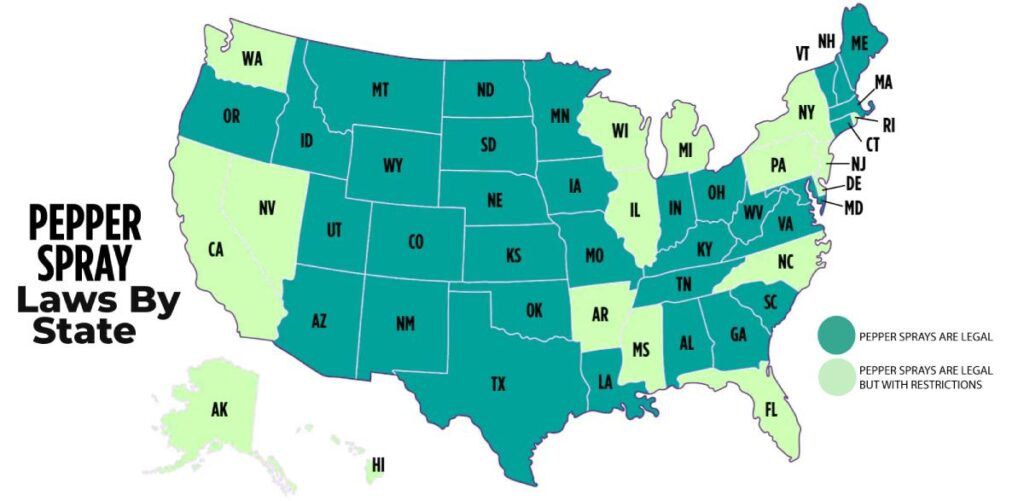Table of Contents
- New Restrictions on Pepper Spray Sales in New York City
- Legal Obligations for Possession and Use of Pepper Spray
- Impact of New Regulations on Consumer Safety and Security
- Guidelines for Compliance and Responsible Ownership
- In Conclusion
New Restrictions on Pepper Spray Sales in New York City
In a significant move to regulate self-defense products, New York City has implemented stricter guidelines on the sale and possession of pepper spray. These changes aim to enhance public safety while ensuring that only responsible individuals have access to such items. Retailers are now required to adhere to rigorous verification processes, including verifying buyers’ age and residency status. Additionally, the sale of pepper spray is limited to specific licenses and designated outlets. Violations of these new requirements may result in substantial fines and legal consequences.
The updated laws also emphasize clear usage and possession protocols. Residents must now register their pepper spray with local authorities, and carrying these devices in restricted areas such as schools, government buildings, and public transportation is strictly prohibited. Key points of the new regulations include:
- Mandatory buyer authentication and proof of eligibility at point of sale.
- Limitation of sales to licensed vendors and official dealers only.
- Required registration of pepper spray devices with city law enforcement.
- Prohibition of possession in sensitive or restricted zones within city limits.
Legal Obligations for Possession and Use of Pepper Spray
New York law has tightened regulations surrounding the possession and use of pepper spray to ensure public safety while balancing self-defense rights. Individuals aged 18 and over are now required to purchase pepper spray products from licensed vendors only, with all sales meticulously documented to prevent unlawful distribution. Carrying pepper spray outside of one’s residence or workplace mandates strict adherence to specified quantities and disallows modifications that could enhance its potency beyond the legal standard. Users must also refrain from brandishing or deploying pepper spray except in genuine self-defense situations, as misuse may result in criminal penalties or civil liabilities.
Key legal considerations include:
- Possession is limited to commercially packaged pepper spray products approved by state authorities.
- Use is strictly restricted to personal defense against imminent threats; any offensive use is prosecutable.
- Transportation of pepper spray must be in its original, sealed container unless actively in use during a defensive encounter.
- Sale and purchase require valid government-issued identification, with records maintained for potential law enforcement review.
- Certain locations, such as schools and government buildings, prohibit carrying pepper spray outright.
Impact of New Regulations on Consumer Safety and Security
Recent legislative adjustments have significantly strengthened the framework surrounding pepper spray regulations, directly enhancing consumer protection. These changes introduce stricter guidelines for purchase eligibility and impose rigorous identification requirements, effectively reducing unauthorized access. Retailers are now obligated to verify purchaser credentials more thoroughly, ensuring that pepper spray remains a tool for self-defense rather than falling into the wrong hands. Additionally, packaging and labeling standards have been elevated, promoting safer usage and clear communication of potential risks associated with the product.
The updated laws also prioritize public security by mandating comprehensive educational initiatives alongside sales. Consumers will benefit from increased awareness programs emphasizing responsible handling and legal boundaries. Key measures include:
- Mandatory safety briefings prior to transaction completion
- Age restrictions with robust enforcement to limit access to minors
- Registration requirements enabling better tracking and accountability
Collectively, these reforms strive to reduce misuse incidents and improve overall community safety, creating a more secure environment where self-defense tools are regulated and responsibly utilized.
Guidelines for Compliance and Responsible Ownership
To align with the recent changes in legislation, individuals purchasing or possessing pepper spray in New York must adhere to specific regulations designed to promote safety and legal compliance. These include requirements such as ensuring the product is acquired from authorized vendors and is accompanied by proper documentation. Additionally, users must be at least 18 years old and are encouraged to receive training on safe handling practices to minimize the risk of accidental discharge or misuse.
Responsible ownership also entails strict observance of usage limitations, as deploying pepper spray in any circumstance outside of legitimate self-defense can lead to significant legal consequences. Key points to remember include:
- Never use pepper spray on minors or in crowded public spaces.
- Avoid carrying the spray in restricted areas such as schools and government buildings.
- Store the device securely and out of reach of children or unauthorized individuals.
Following these guidelines not only preserves personal safety but also ensures compliance with state laws, fostering a responsible approach to self-defense within the community.
In Conclusion
As New York implements these updated regulations on the sale and possession of pepper spray, residents and visitors alike are encouraged to stay informed and comply with the new legal standards. These changes aim to balance personal safety with responsible use, reflecting the state’s commitment to public security. For continued updates and detailed guidance, individuals should consult official state resources or legal experts to ensure adherence to the evolving laws.Check Our Other Blogs
- StunGun – Your Trusted Source for Stun Guns, Laws, and Self-Defense Tips
- PepperSprayLaws – Your Trusted Resource for Pepper Spray Information
- StunGunLaws – Your Trusted Guide to Stun Gun Legality and Safety




